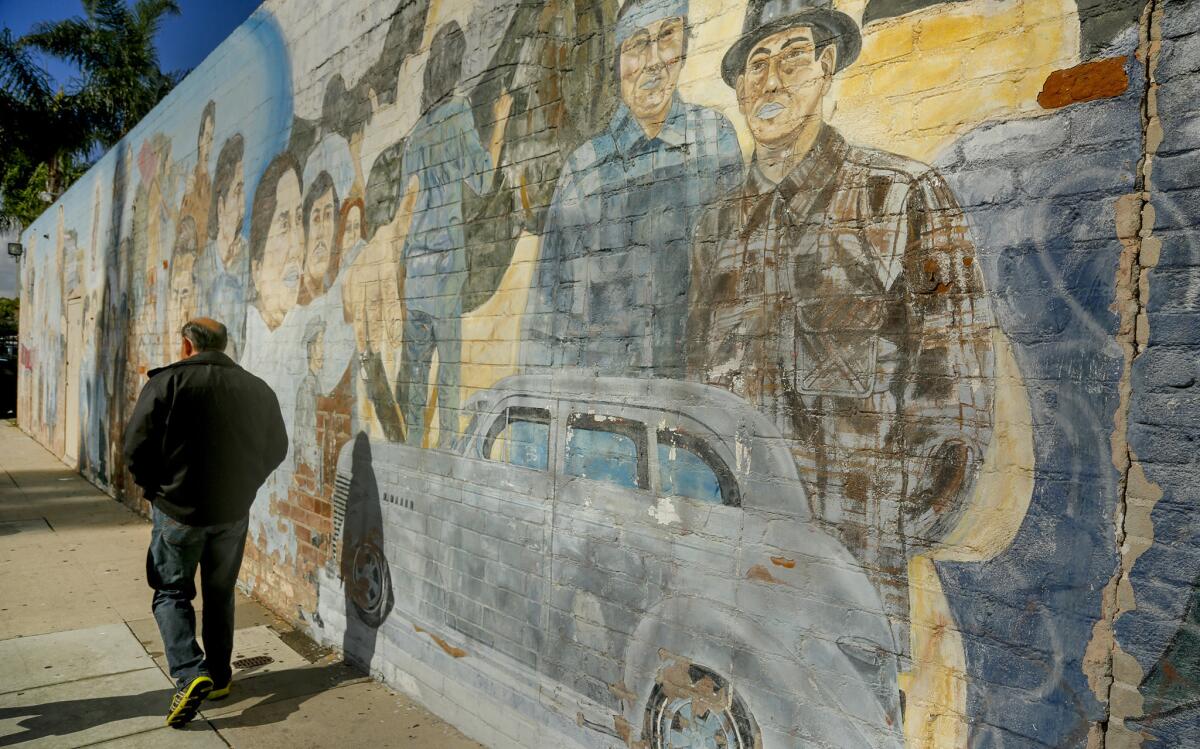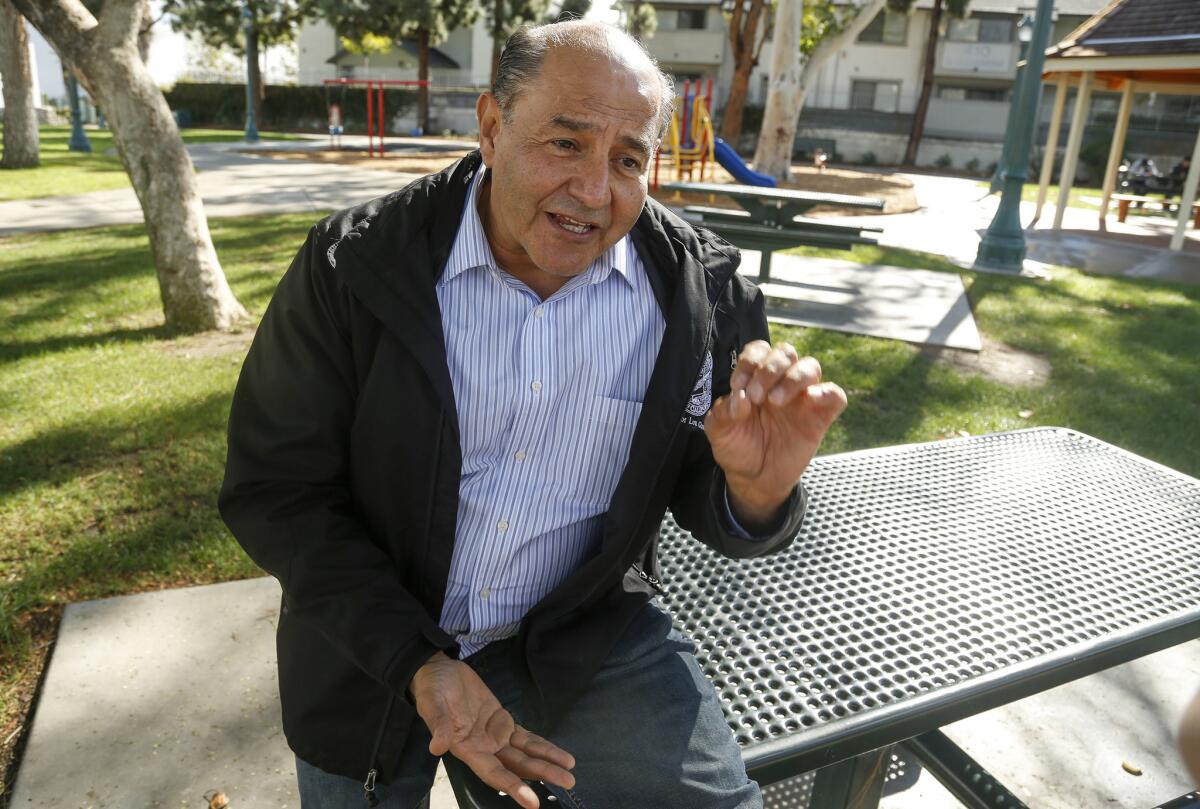Orange County’s new ‘homegrown’ congressman plans to bring an immigrant’s perspective to Washington

Lou Correa, the newly elected representative of the 46th Congressional District covering parts of Orange County, discusses his impending move to Washington, D.C.
- Share via
There’s the Lou Correa who many voters have met on the campaign trail: the self-described “homegrown” candidate who’s an affable but unapologetic, middle-of-the-road Democrat.
But there’s another Correa that few have ever heard of: a man who lived much of his early life in Mexico, learned English as a second language and says his life story was largely written on some of the toughest streets in Orange County.
That’s the version Correa says he’ll carry with him as he’s sworn in next month as Orange County’s newest member of Congress. He defeated fellow Democrat Bao Nguyen in November to fill Loretta Sanchez’s seat and represent the 46th Congressional District, which covers Orange, Santa Ana, Anaheim and Garden Grove.
“To me, it’s a testament to the greatness of this country, where a person that grew up in this neighborhood can actually make it to the U.S. Congress,” Correa said recently during a visit to an area once called Penguin City, the Anaheim neighborhood where he grew up.
In his first term as a congressman, under a Trump presidency that he hardly anticipated, Correa says one of his first priorities will be to address the mass deportations the president-elect has promised. In his Orange County district, two-thirds of residents are Latino.
“People are scared to death right now,” said Correa, 58. “My role is one of education. The new immigrants are not here to cheat or steal. They’re here to work hard and be part of the American Dream.”
Correa draws from personal experience.
SIGN UP for our free Essential Politics newsletter >>
His grandfather first came to the United States in the early 1910s to work on the Southern Pacific Railroad, and was later forced to leave the country when the Great Depression hit, Correa said. His American-born father and his aunts and uncles followed his grandfather to Mexico. Eventually, his father married and settled his new family in California.
Correa, born in East Los Angeles, said he was nearly 2 years old when his mother was killed in a car accident in Mexico. He lived with his father in Zacatecas for the next five years before the family moved back to Anaheim.
There, with his father, sister and an aunt he came to call “Mom,” the family struggled to make ends meet, his father toiling in a cardboard factory and his aunt earning $1.50 an hour cleaning hotel rooms near Disneyland.
“We were a typical immigrant family. You get here, you live in overcrowded conditions, you’re just trying to survive,” he said.
Correa, who was just starting the second grade, spoke only Spanish. With few bilingual resources available in the mid-1960s, he grappled with English for years.
The family lived in tiny apartments and one-bedroom houses, moving when the rent got too high. They scraped by, Correa said, once returning a rented television set when they realized they couldn’t afford it.
We were a typical immigrant family. You get here, you live in overcrowded conditions, you’re just trying to survive.
— Congressman-elect Lou Correa on growing up in Anaheim
Sometimes, when his aunt went home to Mexico and his father was away, he said, he drifted from couch to couch, staying with family or neighborhood friends so he could keep going to school.
“I had enough to eat, and I had a roof over me when I slept. That’s all I really cared about,” he said.
He managed to graduate from Anaheim High School and went on to earn a bachelor’s degree in economics from Cal State Fullerton. He lived at home while earning a law degree and a master’s degree in business from UCLA.
He married his wife, Esther, in 1990 and they lived with his father in the same Anaheim neighborhood until Correa was well into his 40s.

He went on to work as an attorney, investment banker and real estate broker.
“When you grow up poor, the first thing you want to do is not be poor,” Correa said of his initial focus on success in business.
But in 1994, the passage of Proposition 187 drew him out of private enterprise. The law contained provisions that were later struck down that sought to bar immigrants who were in the United States illegally from accessing education and healthcare.
“To me, it was a personal insult, a personal hurt to see that Californians voted for Prop. 187,” Correa said.
In 1996, Correa and Loretta Sanchez, then another political unknown, challenged the Republican establishment in Orange County, running parallel campaigns for Assembly and Congress. Sanchez toppled conservative Bob Dornan in an upset, but Correa lost by just 93 votes. In a rematch two years later, Correa easily beat Republican Jim Morrissey, and Democrat Joe Dunn won the region’s Senate seat, creating a progressive toehold in the county.
“It was the beginning of significant new leadership coming to Orange County, and the beginning of where we are today,” Wylie Aitken, who ran Sanchez’s first campaign, said of the three wins.
In the statehouse, Correa built a reputation as an independent voice and unabashed moderate who bucked his party on crucial votes. Colleagues called him “Sweet Lou” for his demeanor, despite many of the votes he took against their bills.
He voted against an overhaul of the state healthcare system that was later vetoed by Gov. Arnold Schwarzenegger. In 2010, he earned the lowest score of any legislative Democrat from LGBT rights group Equality California. Correa says he has “evolved” on LGBT issues, promising to introduce a bill reversing dishonorable discharges in the military under the Don’t Ask Don’t Tell policy.

Former state Senate leader Don Perata — who once locked Correa out of his office for associating with moderate Democrats — called the incoming congressman an astute politician with a street-level understanding of his district.
“A lot of politicians will wring their hands and put a wet finger in the air to get a feel for what he should do,” Perata said. “Lou just intuitively knew.”
Darrell Steinberg, another former Senate leader, recalled Correa’s deciding vote on a bipartisan budget deal that included painful cuts and temporary tax hikes. Correa voted for it despite his opposition to raising taxes, eventually allowing the state to crawl out of crippling budget deficits.
“That probably saved the state and we didn’t have a vote to spare,” Steinberg said.
A lot of politicians will wring their hands and put a wet finger in the air to get a feel for what he should do. ... Lou just intuitively knew.
— Former State Senate leader Don Perata on Correa’s political acumen
There was one issue on which Correa rarely wavered: immigration. He voted numerous times for bills seeking to establish immigrant driver’s licenses, and championed a law that allowed minors whose parents were deported to retain California residency to pay in-state college tuition.
He has criticized President Obama for a record number of deportations and in 2006 was the only Orange County supervisor to vote against allowing sheriff’s deputies to check the immigration status of county jail inmates.
While Correa has often said he aims to represent all constituents, not just Latinos, he also says he sees immigrants as part of the fabric of the country and his district. He supports efforts to create a path to citizenship and hopes to help the young people known as Dreamers, who were brought to the United States illegally as children.
“You can’t just turn around and take these people out of the economic system and not have negative repercussions,” Correa said. “We have to do everything we can to make sure folks understand the implications of taking these draconian measures.”
Correa acknowledges that doing so under a President Trump and a Republican-controlled Congress is going to be “a hard sell.” Despite his ambitions for his first term — he says he wants to serve on the House Transportation and Financial Services committees — it’s unlikely Democrats will be able to make headway on major policy initiatives.
While other California Democrats are getting ready to do battle with the GOP, Correa says he’s taking a wait-and-see approach with Trump.
“I’ll engage him wherever I can, but we’re going to take him on whenever we have to,” he said, adding that he has good relationships with the Republicans in California’s delegation, several of whom served with him in the Legislature.
For now, Correa has been busy choosing a staff, attending orientations in Washington and setting up an office before he’s sworn in on Jan. 3.
On Capitol Hill last week, Correa had tears in his eyes as he recalled the moment he walked onto the House floor for the first time. He thought back to his humble beginnings and his Anaheim neighborhood, where he said many went to prison or died of heroin overdoses.
He thought also of the mother who had raised him, who died shortly after the June primary and wouldn’t see her son become a U.S. congressman.
“She would have been very proud to have seen me sworn in,” he said.
Los Angeles Times staff writer Sarah D. Wire contributed to this report.
For more on California politics, follow @cmaiduc on Twitter.
ALSO:
Meet the three Latinos Southern California voters just elected to Congress
Trump’s crackdown on illegal immigration leaves a lot unanswered for sanctuary cities like L.A.
More to Read
Get the L.A. Times Politics newsletter
Deeply reported insights into legislation, politics and policy from Sacramento, Washington and beyond. In your inbox three times per week.
You may occasionally receive promotional content from the Los Angeles Times.











